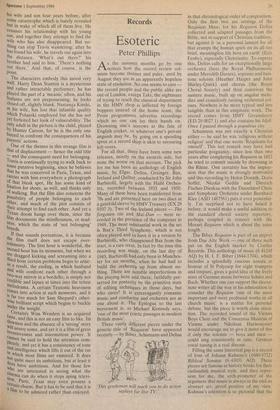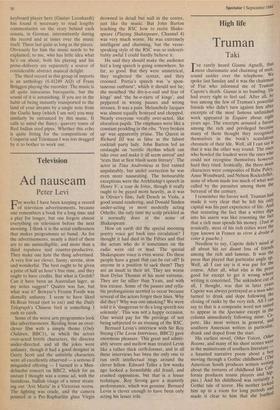Records
Esoteric
Peter Phillips
As the summer months go by one notices how the record review col- umns become thinner and paler, until by August they are in an apparently hopeless state of etiolation. No one seems to care — the record people and the public alike are out of London, except Taki; the nightmare of trying to reach the classical department in the HMV shop is inflicted by foreign boppers instead of the home team; the Prom programmes advertise recordings which no one can lay their hands on. Drowning one's sorrows at the fate of English cricket, or whatever one's private anguish may be, by going on a spending spree at a record shop is akin to savouring left-overs.
For all that, there have been some new releases, mostly on the esoteric side, but none the worse on that account. The pick for me has been an anthology of English music, by Elgar. Delius, Grainger, Bax, Ireland and Quilter, conducted by Sir John Barbirolli, largely with the Halle Orches- tra, recorded • between 1933 and 1950. Many of these have been transferred from 78s and are presented here on two discs in a gatefold sleeve by HMV Treasury (EX 29 0107 3). Two of the Ireland pieces — The forgotten rite and Mai-Dun — were re- corded in the presence of the composer in 1949. The most substantial work in the set is Bax's Third Symphony, which is not often played and to have it in a version by Barbirolli, who championed Bax from the start, is a rare treat. In fact by the time this recording was made,, on the last day of 1943, Barbirolli had only been in Manches- ter for six months, when he had had to build the orchestra up from almost no- thing. There are notable imperfections in the playing here and there, faithfully pre- served for posterity by the primitive state of editing techniques in those days, but who cares? It is extravagantly romantic music and conductor and orchestra are as one about it. The Epilogue to the last movement is, as Michael Kennedy says, 'one of the most poetic passages in modern British music'.
Three vastly different pieces under the generic title of 'Requiem' have appeared recently — by Biber, Schumann and Delius 'This gentleman will teach you to do action replays for live TV.' in that chronological order of composition. Only the first two are settings of the Requiem Mass; for his Requiem Delius collected and adapted passages from the Bible, not in support of Christian tradition, but against it 'as a personal lament for all that cramps the human spirit on its all too brief, meaningless life here on earth' (Eric Fenby), especially Christianity. To express this, Delius calls for an exceptionally large orchestra (here the Royal Philharmonic under Meredith Davies), soprano and bari- tone soloists (Heather Harper and John Shirley-Quirk) and chorus (the Royal Choral Society) and then conceives the austere music, built up on angular melo- dies and ceaselessly turning orchestral col- ours. Nowhere is he more typical and less tangible than in this enigmatic work. The record comes from HMV Greensleeve (ED 29 0027 1) and also contains his Idyll: Once I passed through a populous city.
Schumann was not exactly a Christian either — he said he was 'religious without religion' and that one wrote 'Requiems for oneself'. This last remark may have had particular poignancy, since less than two years after completing his Requiem in 1852 he tried to commit suicide by drowning in the Rhine:. One certainly has the impres- sion that the music is strongly motivated and this recording by Helen Donath, Doris Soffel, Nicolai Gedda and Dietrich Fischer-Dieskau with the Dusseldorf Choir and Symphony Orchestra under Bernhard Klee (ASD 1467561) puts it over powerful- ly. I'm surprised not to have heard it before: it would make a useful addition to the standard choral society repertory, perhaps coupled in concert with the Mozart Requiem which is about the same length.
The Biber Requiem is part of an import from Das Alte Werk — one of three such put on the English market by Conifer Records. This anthology of music (6.41245 AQ) by H. I. F. Biber (1644-1704), which includes a splendidly raucous sonata in honour of St Polycarp for eight trumpets and timpani, gives a good idea of the lively state of German music between Schutz and Bach. Whether one can support the sleeve- note writer all the way in his admonition to consider the Requiem 'one of the most important and most profound works in all church music' is a matter for personal debate, but the piece is worth close atten- tion. The recorded sound of the Vienna Boys Choir and the Concentus Musicus of Vienna under Nikolaus Harnoncourt would encourage me to give it more of this if only the soloists — boys and men — could sing consistently in tune. German vocal tuning is a real disease.
Filling the same historical gap is a record of four of Johann Kuhnau's (1660-1722) Biblical Sonatas (6.43031 AQ). These pieces are famous in history books for their outlandish musical style, and they repre- sent for me, the arch-promoter of the argument that music is always in the end an abstract art, proof positive of my view. Kuhnau's intention is so pictorial that the keyboard player here (Gustav Leonhardt) has found it necessary to read lengthy commentaries on the story behind each sonata, in German, intermittently during the record and at times over the music itself. These last quite as long as the pieces. Obviously for him the music needs to be explained; to me, who has little idea what he's on about, both his playing and his prose-delivery are separately a source of considerable abstract musical delight.
The third record in this group of imports is an anthology (6.41249 AQ) of Frans Briiggen playing the recorder. The music is all quite innocuous baroquerie, but the sound of it is astonishing. If you are in the habit of being instantly transported to the land of your dreams by a single note from the Gaelic harp (which I am not) you may similarly be entranced by this music. It calls to mind the flutey, quavery tones of Red Indian reed pipes. Whether this echo is quite fitting for the compositions of Couperin and Telemann I was too drugged by it to bother to work out.











































 Previous page
Previous page